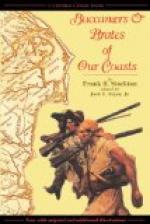Therefore it was that a pirate ship was a very welcome visitor in Charles Town harbor. She was generally loaded with goods, which, as they were stolen, her captain could afford to sell very cheaply indeed, and as there was always plenty of Spanish gold on board, her crew was not apt to haggle very much in regard to the price of the spirits, the groceries, or the provisions which they bought from the merchants of the town. This friendly commerce between the pirates and the Carolinians grew to be so extensive that at one time the larger part of the coin in circulation in those colonies consisted of Spanish gold pieces, which had been brought in and used by the pirates for the purchase of goods.
But a pirate is very seldom a person of discretion, who knows when to leave well enough alone, and so, instead of contenting themselves with robbing and capturing the vessels belonging to people whom their Charles Town friends and customers would look upon as foreigners, they boldly sailed up and down the coast, seeking for floating booty wherever they might find it, and when a pirate vessel commanded by an English captain and manned principally by an English crew, fell in with a big merchantman flying the English flag, they bore down upon that vessel, just as if it had been French, or Spanish, or Dutch, and if the crew were impertinent enough to offer any resistance, they were cut down and thrown overboard.
At last the pirates became so swaggeringly bold and their captains so enterprising in their illegal trading that the English government took vigorous measures, not only to break up piracy, but to punish all colonists who should encourage the freebooters by commercial dealings with them. At these laws the pirates laughed, and the colonists winced, and there were many people in Charles Town who vowed that if the King wanted them to help him put down piracy, he must show them some other way of getting imported goods at reasonable prices. So the pirates went on capturing merchantmen whenever they had a chance, and the Carolinians continued to look forward with interest to the bargain days which always followed the arrival of a pirate ship. But this state of things did not last, and the time came when the people of Charles Town experienced a change of mind. The planters were now growing large quantities of rice, and this crop became so valuable that the prosperity of the colonies greatly increased. And now the pirates also became very much interested in the rice crops, and when they had captured four or five vessels sailing out of Charles Town heavily laden with rice, the people of that town suddenly became aware of the true character of a pirate. He was now in their eyes an unmitigated scoundrel who not only stole goods from all nations, which he brought to them and sold at low prices, but he actually stole their goods, their precious rice which they were sending to England.
The indignant citizens of Charles Town took a bold stand, and such a bold one it was that when part of a crew of pirates, who had been put ashore by their comrades on account of a quarrel, made their way to the town, thinking they could tell a tale of shipwreck and rely upon the friendship of their old customers, they were taken into custody, and seven out of the nine were hanged.




